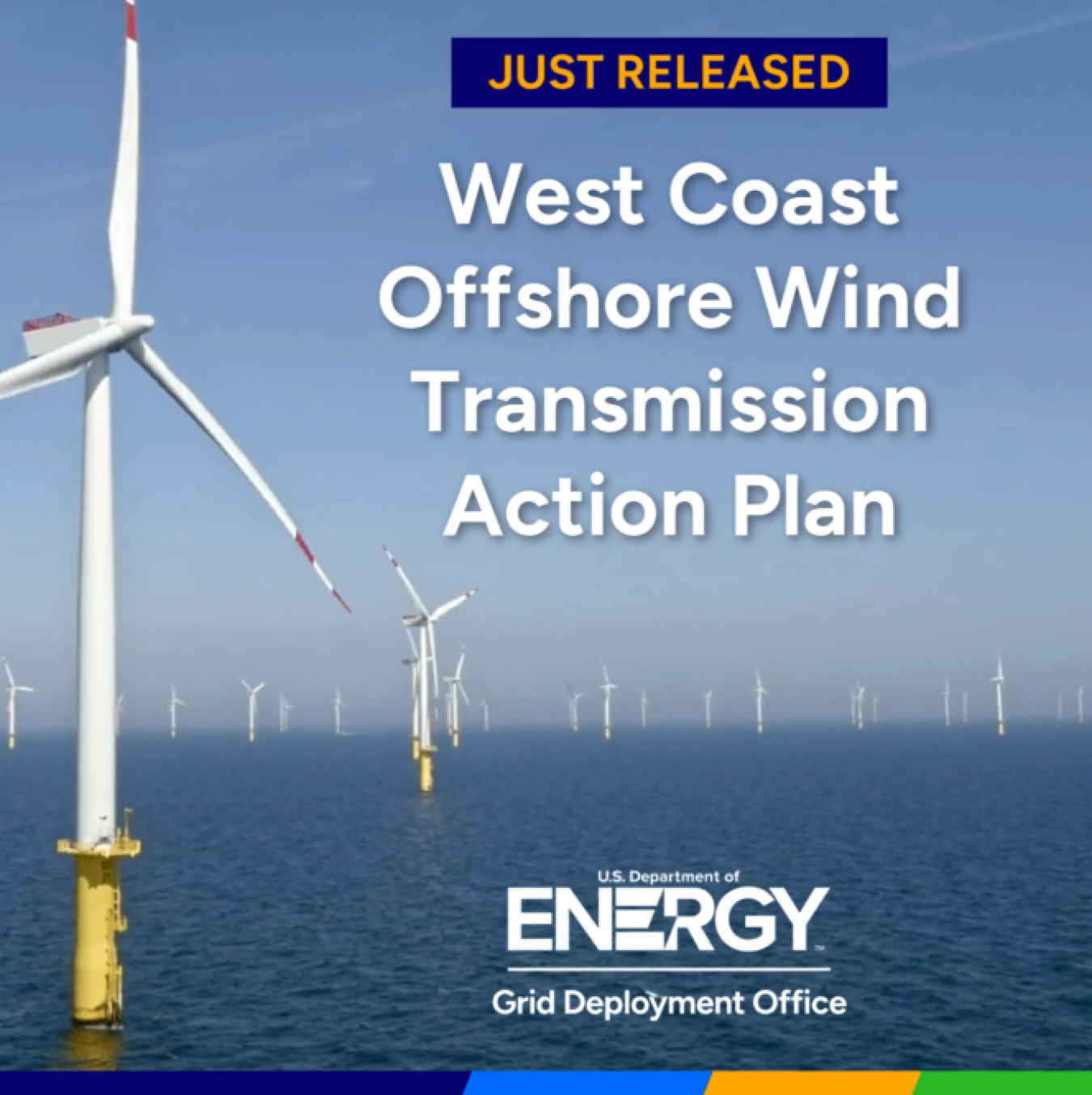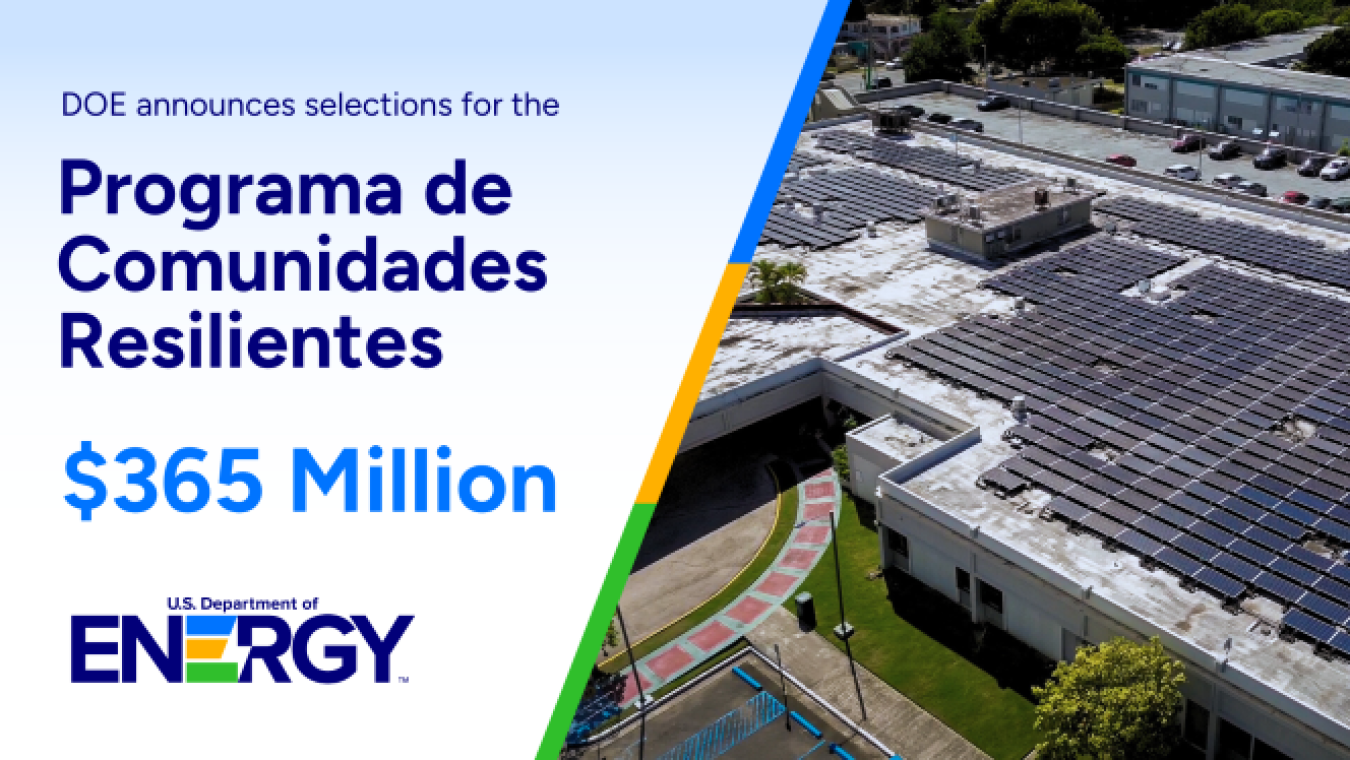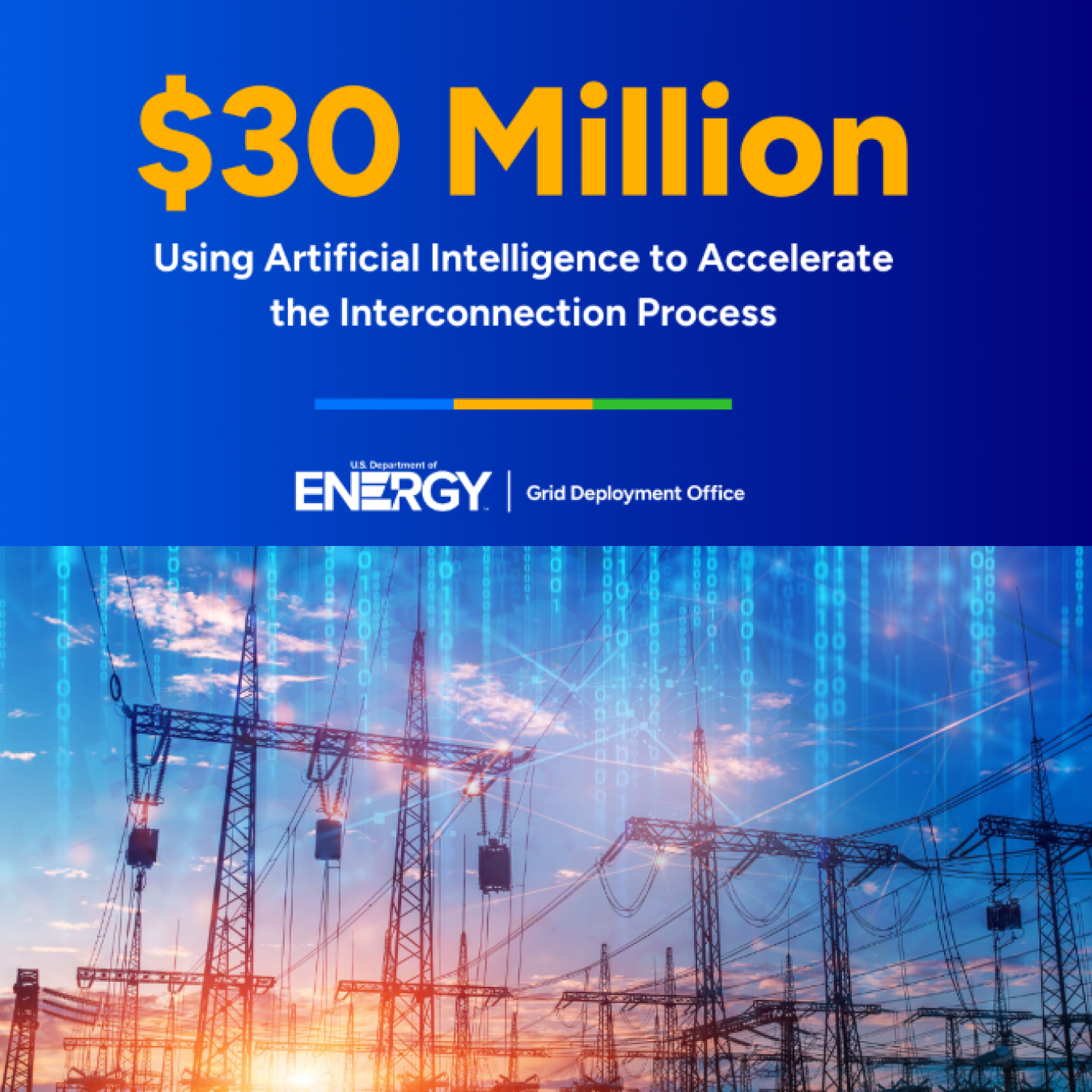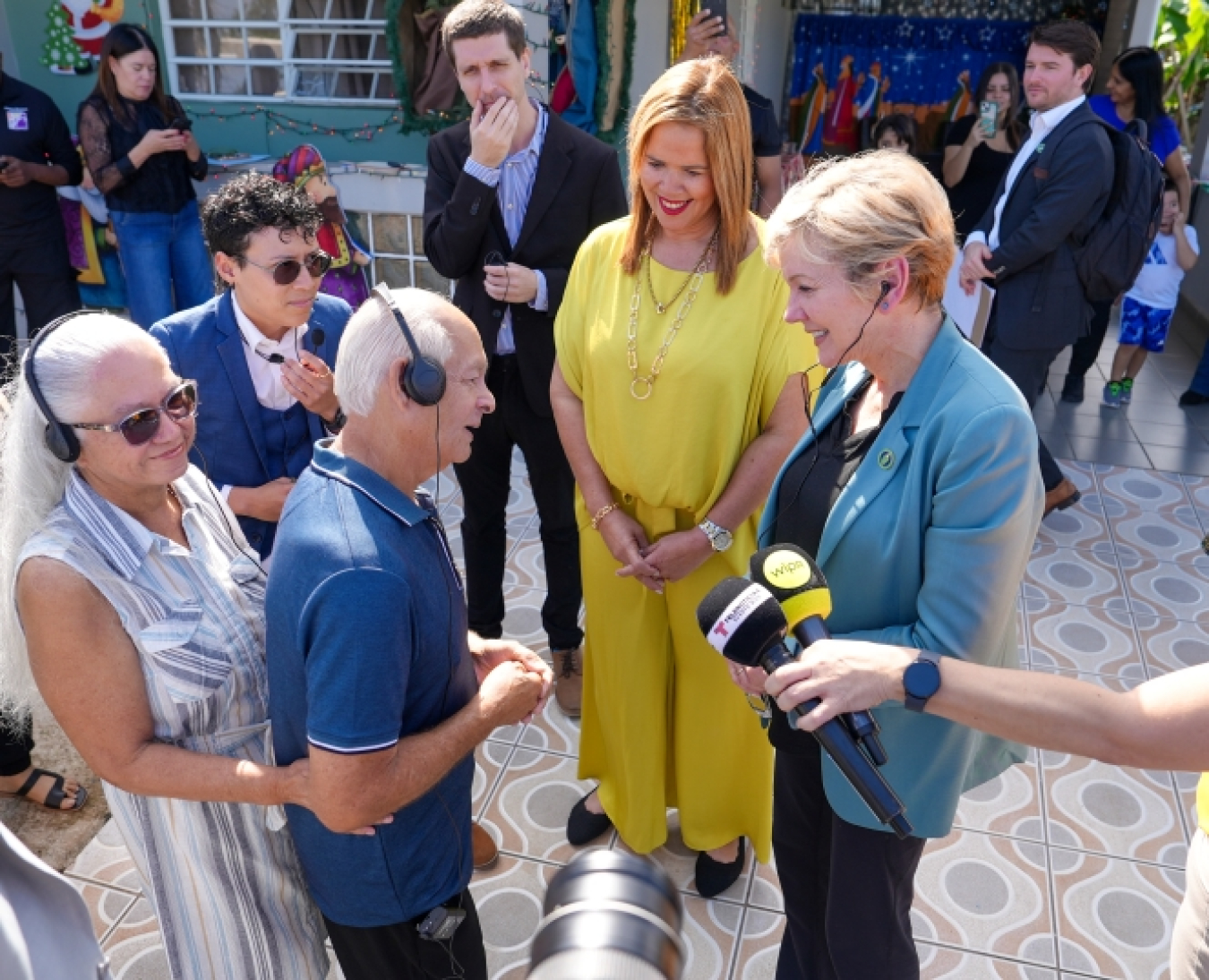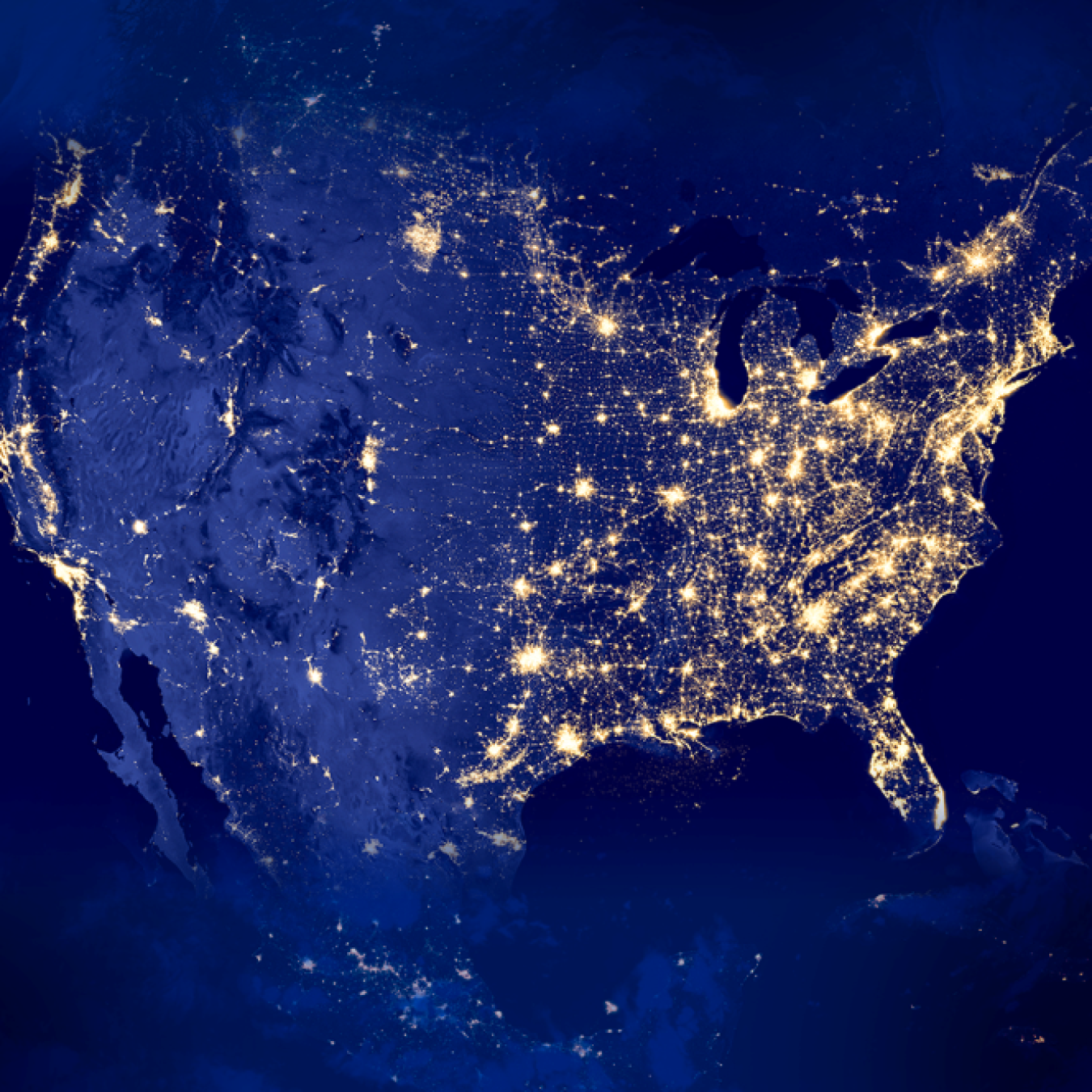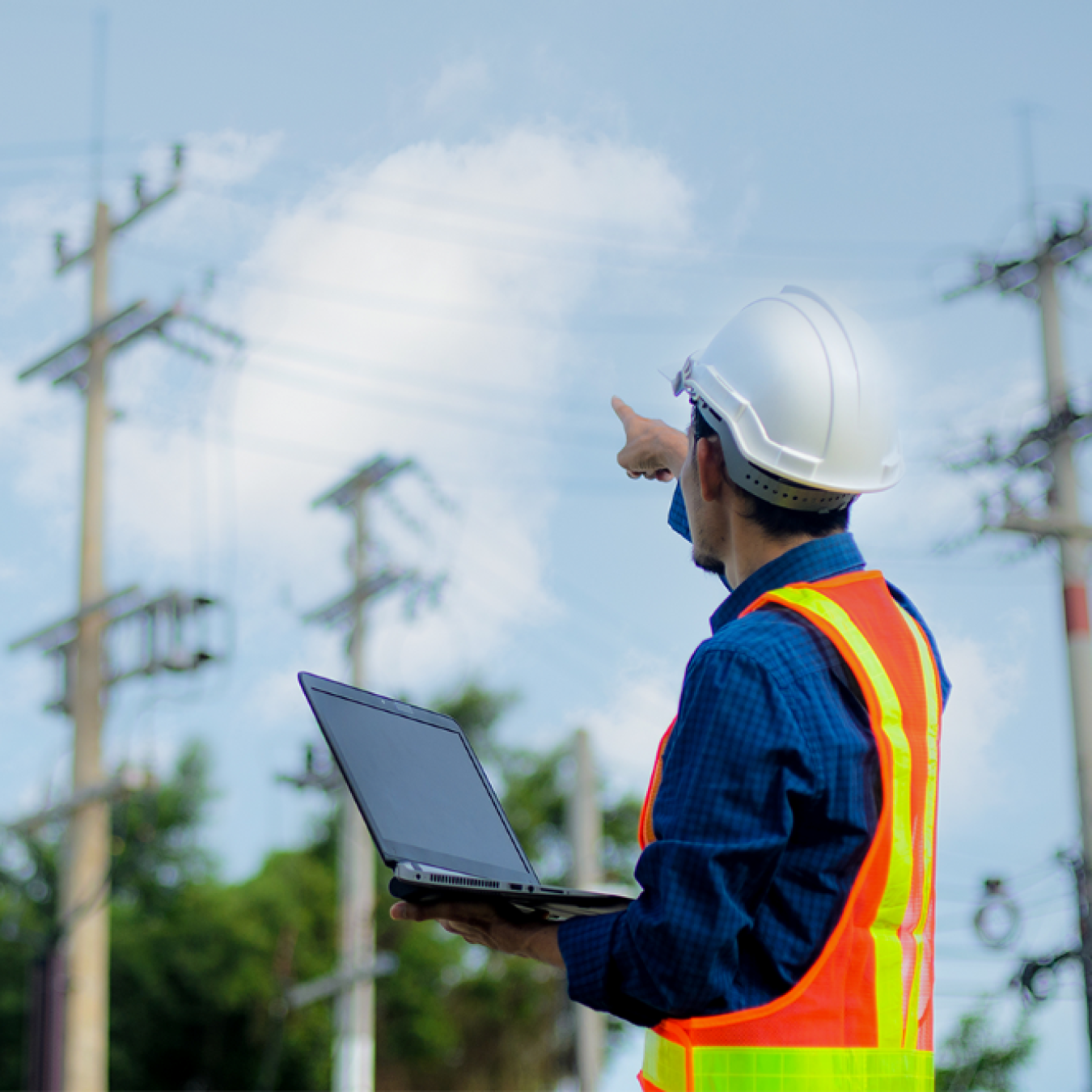Open the January 2025 issue of the Grid Deployment Office Newsletter from the U.S. Department of Energy.
January 17, 2025Recent Announcements
Biden-Harris Administration Announces Three High-Priority Areas Advancing in National Interest Electric Transmission Corridor Designation Process
DOE Seeks Public Input on Proposed Public Engagement Framework and Possible Scope of Analysis for Areas Moving to Phase 3 of Designation Process
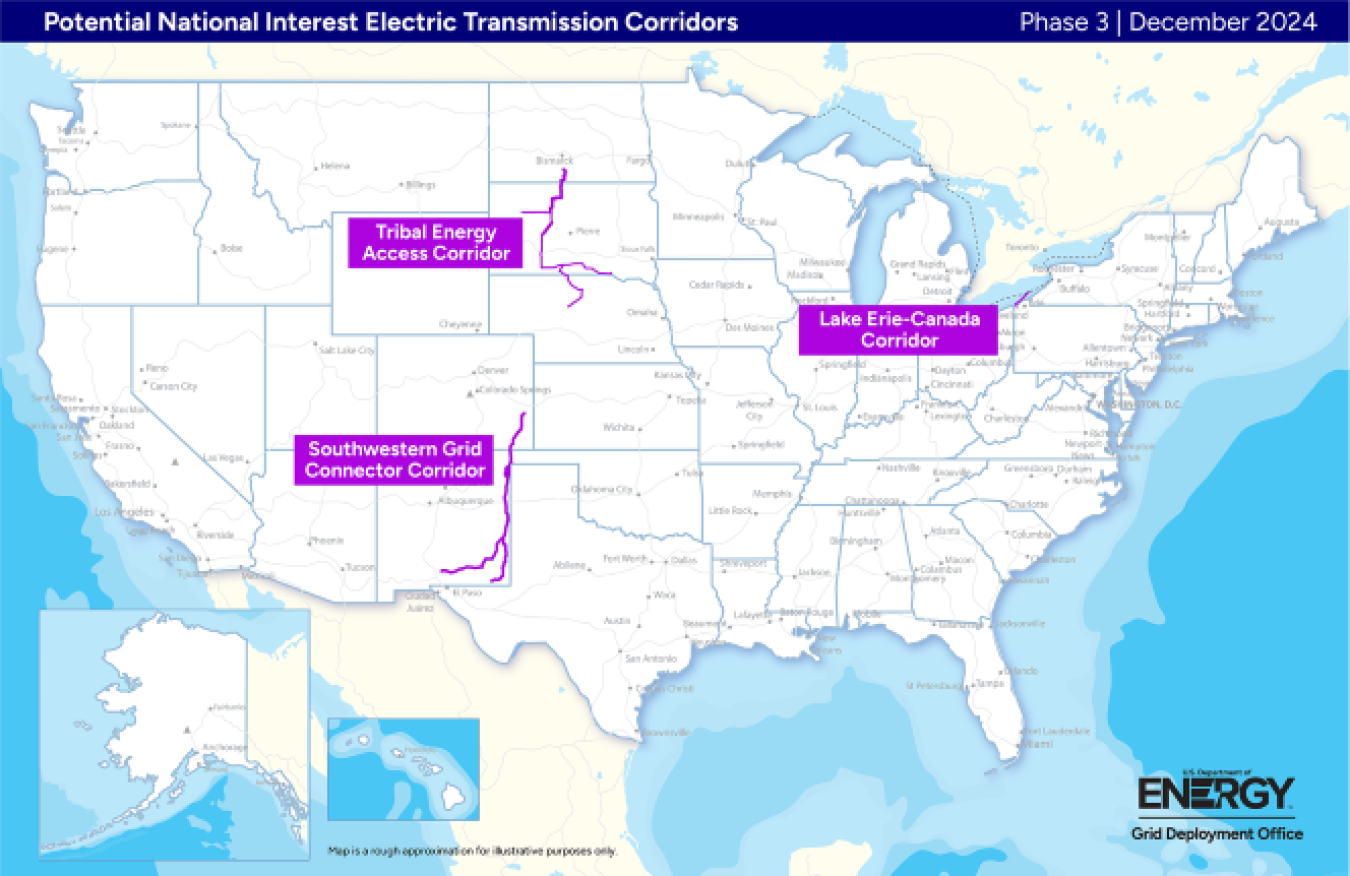
In a continued effort to expedite the build out of a resilient and reliable electric grid, the U.S. Department of Energy (DOE) released a list of three potential National Interest Electric Transmission Corridors (NIETCs) moving to the next phase of the designation process. A NIETC is an area of the country where DOE has determined the lack of adequate transmission harms consumers and the development of transmission would advance important national interests in that area, such as increased reliability and reduced consumer costs. DOE recently established a four-phase process for NIETC designation; the potential NIETCs moving to Phase 3 of the designation process are:
- Lake Erie-Canada Corridor, including parts of Lake Erie and Pennsylvania
- Southwestern Grid Connector Corridor, including parts of Colorado, New Mexico, and a small portion of western Oklahoma
- Tribal Energy Access Corridor, including central parts of North Dakota, South Dakota, Nebraska, and five Tribal Reservations
DOE West Coast Offshore Wind Transmission Action Plan Charts Path to Increase Domestic Energy Production, Provide Cost Savings, Improve Grid Reliability and Local Energy Resilience, and Create Jobs
Roadmap Shows Phased and Flexible Coastal and Offshore Transmission Build Out Will Maximize Economic Benefits, Enhance Grid Reliability, and Minimize Environmental Impact
DOE's Grid Deployment Office (GDO), in partnership with the U.S. Department of the Interior’s (DOI) Bureau of Ocean Energy Management (BOEM), released the Action Plan for Offshore Wind Transmission Development in the U.S. West Coast Region (Action Plan) to address coastal and offshore wind (OSW) transmission challenges on the U.S. West Coast. The Action Plan provides recommendations on how to connect the first generation of West Coast offshore wind projects to the Western electric grid and support transmission over the next several decades, while also producing cost savings, improved grid reliability, local energy resilience, and substantial job creation.
Biden-Harris Administration Announces Additional $28.7 Million to Protect the Grid Against Extreme Weather
Florida Community to Deploy Utility-Scale Battery Storage System to Support Critical Community Services and Save Municipal Utility Customers Money
DOE announced a $28.7 million investment in a more resilient and equitable energy system to protect Florida communities and businesses against extreme weather events. Supported by a Grid Resilience and Innovation Partnerships (GRIP) Program Grid Resilience Grant, the City of Tallahassee Electric & Gas Utility’s selected project will deploy a utility-scale battery energy storage system (BESS) to provide backup power to facilities providing critical services, like nursing homes and community centers. The BESS is also expected to provide an estimated overall annual fuel cost savings of $160,000 that will benefit municipal utility customers.
A full list of GRIP projects, including awards finalized to date, is available here.
DOE Announces up to $365 Million to Equip Multifamily Housing and Healthcare Facilities Across Puerto Rico with Resilient Solar and Battery Storage
DOE’s Programa de Comunidades Resilientes will Provide Reliable Energy to Critical Community Infrastructure within Low- and Moderate-Income Communities
DOE announced four Puerto-Rico-based teams selected to install solar and battery storage systems under its new Programa de Comunidades Resilientes, funded by DOE’s Puerto Rico Energy Resilience Fund (PR-ERF). This investment of up to $365 million aims to improve community-level energy resilience for vulnerable populations across Puerto Rico, funding solar and battery storage installations for community healthcare facilities as well as common areas within public housing and privately owned subsidized multi-family properties. This investment will also boost local workforce development opportunities in Puerto Rico.
Biden-Harris Administration Announces $30 Million to Ease Interconnection Backlog, Deliver More Energy Supply on America’s Power Grid
New Initiative Will Utilize Artificial Intelligence to Help Shorten Interconnection Application Process Timelines
DOE announced up to $30 million available from the Bipartisan Infrastructure Law to accelerate the interconnection process for new energy generation through the introduction of artificial intelligence techniques. The new Artificial Intelligence for Interconnection (AI4IX) Program will develop partnerships between software developers, grid operators (including Regional Transmission Operators (RTOs) and Power Marketing Administrations), and energy project developers to modernize the interconnection application process and significantly reduce the time required to review, approve, and commission new generation interconnections across the country.
News and Updates
#ICYMI: Recent Newsletters from GDO
Building a Better Grid Awards Newsletter
To share how historic levels of federal and private investment are positively impacting communities across the country, this monthly newsletter from GDO showcases grid projects that have successfully completed award negotiations and are beginning work.
Puerto Rico Energy Recovery and Resilience Newsletter
To share how DOE supports grid recovery and resiliency efforts in Puerto Rico through planning assistance, operational activities, and capacity building for both local public entities and federal agencies, ensuring investment decisions are driven by world-class data, modeling, and analysis, this English and Spanish newsletter highlights the latest milestones, updates, and highlights of this work.
2024 Wrap-Up: Advancing a More Powerful Grid
In the two years since its creation, GDO has announced $14.5 billion in competitive funding selections and formula grants to advance a more affordable, reliable, and resilient grid. Check out the 2024 Wrap-Up, in which we share highlights and accomplishments made through these efforts from the past year.
New Videos in Powering Communities Video Series
Upgrading the Grid in Horry County
The Powering Communities video series was developed to help tell the story about how GDO investments are impacting communities across the country and building a more resilient grid for America.
Making Connections with Southline
DOE Providing up to $28 Million to Strengthen Grid Capacity for Data Centers, Manufacturing
GDO is investing up to $28 million through the Collaborations Advancing Rapid Load Additions (CARLA) Program to accelerate deployment of critical infrastructure that supports significant electricity demand driven by data center expansion and the rise of artificial intelligence (AI) applications, domestic manufacturing growth, and electrification. Administered by ConnectWerx, CARLA will help rapidly build grid capacity that can accommodate significant near-term electricity demand growth.
DOE Providing up to $35 Million to Utilities Across the Country to Increase Grid Resilience and Improve Flexibility
GDO is providing up to $35 million to bolster grid resilience and reliability through the Joint Assessment of Resilience in Vulnerable Infrastructure Systems (JARVIS) Program. Administered by TechWerx, JARVIS will enable utilities to enhance grid resilience against extreme weather, improve flexibility through data analytics and smart grid technologies, and facilitate the integration of distributed energy resources.
Get Support for Your Energy Innovation Projects: Apply to Host an Innovator Fellow!
The Energy Innovator Fellowship is a workforce development program that matches qualified recent graduates and professionals with critical energy organizations to help them advance solutions that will help modernize the power system, improve energy infrastructure for transportation and industry, and make the U.S. power system more reliable, affordable, and resilient. Host Institution applications are due January 31, 2025.
Catch Up on Recent Program Updates
- Energy Department Announces Intent to Open State and Tribal Grants to Modernize Electric Grid, Reduce Impacts of Extreme Weather: GDO published FY25 grant allocation amounts and released a Notice of Intent to open the FY25 Grid Resilience State and Tribal Formula Grants application and allocation request period in February 2025. These grants help modernize the electric grid to reduce the impacts of extreme weather and natural disasters while also ensuring the reliability of the power sector.
- Energy Department Announces Long Term Regional Transmission Planning Support for States: GDO announced technical assistance (TA) available to states to help them engage in transmission planning activities, including the new long-term regional transmission planning processes being developed in response to the Federal Energy Regulatory Commission’s (FERC) Order No. 1920.
- GDO Awards Research Consortium through the Standardization for Interregional Offshore Wind Transmission Opportunity: In December 2024, GDO awarded Johns Hopkins University and DNV Power Systems Advisory $1.25 million to develop and lead their ‘Planning Offshore Interregional Network Standardization (“POINTS”) Consortium over the next 12 months. The “Standardization for Interregional Offshore Wind Transmission” opportunity funds a research consortium of technical experts that identifies standardized offshore transmission equipment specifications to support coordinated procurement in the United States, with specific focus on the Atlantic Coast. The consortium will develop best practices and provide guidance on near-term state offshore solicitations and potential shared transmission solutions to promote interconnection and interoperability.
- Six States Participate in CHEERS Cohort: GDO’s Customized Help and Expertise on Energy Resilience for States (CHEERS) Program was developed to provide states with technical assistance, lessons learned, tools, and learning opportunities to execute grid resilience projects and funding opportunities. The program also offers a community of practice via a peer network and educational workshops for continuing collaboration. Six states are currently part of the CHEERS cohort: Illinois, Louisiana, Michigan, North Carolina, Pennsylvania, and West Virginia.
You can learn more about the latest milestones, webinars, and highlights from our technical assistance teams by opting in to receive program specific updates through the GovDelivery topic subscription list. Register for our new Technical Assistance topic to make sure you never miss an email!
Check Out What’s Going On at DOE
Open Opportunities
| OPPORTUNITY | TYPE | RESPONSE DUE |
| Transmission Accelerations Grants (TAG) Program | Funding Opportunity | 1/21/2025 |
| Caribbean Transmission Development Company | Scoping Period | 2/25/2025 |
| Collaborations Advancing Rapid Load Additions (CARLA) Program | Funding Opportunity | 2/28/2025 |
| Joint Assessment of Resilience in Vulnerable Infrastructure Systems (JARVIS) Program | Funding Opportunity | 4/18/2025 |
Recent Meeting Materials
| DATE | MEETING | MATERIALS |
| 1/16/2025 | National Interest Electric Transmission Corridor: Lake Erie-Canada Corridor Webinar | Available Soon |
| 1/15/2025 | National Interest Electric Transmission Corridor: Southwestern Grid Connector Corridor Webinar | Available Soon |
| 1/14/2025 | National Interest Electric Transmission Corridor: Tribal Energy Access Corridor Webinar | Available Soon |


